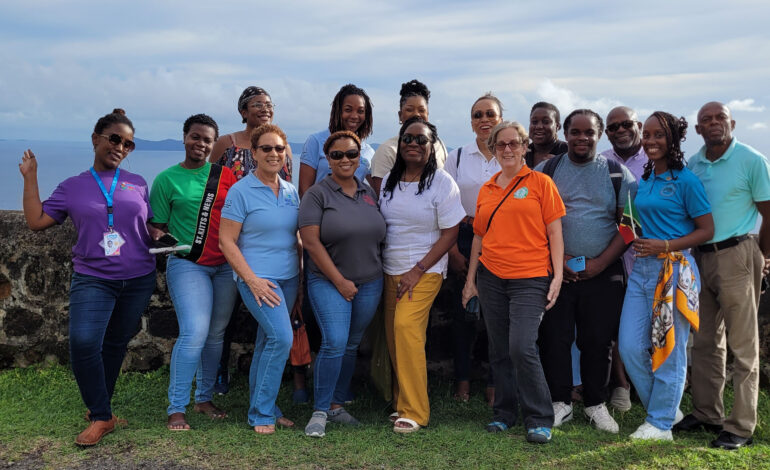
The Food and Agricultural Organization of the United Nations (FAO) together with Saint Lucia’s Ministry of Agriculture Fisheries, Food Security and Rural Development conducted a one-day workshop of Agricultural Extension, Livestock, and Engineering Officers on Saint Lucia’s updated draft Farmer Field School (FFS) Manual.
Taking place on 30 November 2022, the workshop was a collaborative effort between the ‘Resilient School Feeding Programme’ sub-project of the Mexico-CARICOM-FAO Initiative “Cooperation for Climate Change Adaptation and Resilience in the Caribbean” or Resilient Caribbean Initiative in short and the FAO’s “Capacity Building Related to Multilateral Environmental Agreements in ACP Countries (ACP MEAs 3) Project”. With the aim to support local farmers and communities, the updated FFS manual will improve agricultural practices, enhance commercial farming, solve day-to-day field problems and build sustainable farmer institutions able to address farmer’s needs and problems. Practiced globally, Farmer Field Schools (FFS) are a participatory education approach that brings together farmers to solve production problems through sustainable agriculture and offers space for hands-on group learning, enhancing skills for observation and critical analysis and improved decision making by local communities.
Farmer Field School Facilitator, Cletus Alexander explained, “The FFS approach was introduced to the agricultural sector in Saint Lucia in 2006 and the first FFS was hosted in 2009, where 30 farmers and extension officers benefitted from 3 months of training. Since then, there has been a dire need to revise and update the manual, as the methodology is important for Extension Services as we seek to further build resilience of our agricultural sector and confront global climatic and technological challenges. We are pleased that FAO has provided support in updating the manual and look forward to its implementation in the coming year.”
The revised manual provides guidance on the activities required for successful Farmer Field Schools (FFS) and will be shared among FFS Facilitators as a resource guide in planning and implementing FFS activities in Saint Lucia, as well as other countries. Twenty-five officers benefitted from this training, which focused on the use of the updated manual in their work and to assist in training other stakeholders.
National Project Coordinator for the Resilient School Feeding Programmes sub-project, Cherry Anne Smith shared, “FFS is an important tool that brings farmers together in groups to help solve a common problem that farmers are experiencing. Every training opportunity is important for learning how to better manage all aspects of their farms, which ultimately leads to increased yields and greater cash flow. In turn, this will further benefit communities through the provision of nutritious, locally sourced produce that can be used to ensure access to healthy food in schools.”
Similarly, National Project Coordinator for the ACP MEAs 3 Project, Leshan Monrose, indicated, “The review and update of Saint Lucia’s existing FFS manual is an important first step towards enhancing the capacity of Extension Officers and farmers on emerging topics such as, climate change, nutrition, and nature-based solutions, towards the end goal of better production. Additionally, the revised manual provides practitioners with a variety of tools and techniques which promote the participatory approach and building stronger relationships with farmers.”
With Saint Lucia having benefitted from the FFS approach, the updated manual will contribute to further gains in the agriculture sector. Agricultural Extension Officer and participant in the training, Jeshrun Andrew states, “As an Extension Officer, Farmer Field Schools have helped address many of the challenges farmers encounter in growing a successful crop, especially problems related to pests and disease management. We are happy for the training and the opportunity to transfer knowledge to the farmers.”
Implementation of the updated Farmer Field School Manual will continue in the New Year, with refresher training in FFS methods for Extension Officers and at least one Field School for farmers through the ACP MEAs 3 project.






